Related Research Articles

Israeli settlements, or Israeli colonies, are civilian communities inhabited by Israeli citizens, almost exclusively of Jewish ethnicity, built in violation of international law on lands occupied by Israel in the 1967 Six-Day War. Israeli settlements currently exist in the Palestinian territory of the West Bank, including East Jerusalem, and in the Syrian territory of the Golan Heights. East Jerusalem and the Golan Heights have been annexed by Israel, so residents are treated equivalently to the rest of Israel under Israeli law. Although the West Bank settlements are on land administered under Israeli military rule rather than civil law, Israeli civil law is "pipelined" into the settlements, such that Israeli citizens living there are treated similarly to those living in Israel.
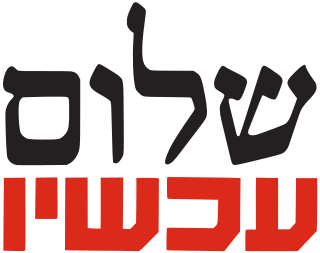
Peace Now is a non-governmental organization, "liberal advocacy" and activist group in Israel with the aim of promoting a two-state solution to the Israeli-Palestinian conflict.
Gush Emunim was an Israeli Orthodox Jewish right-wing activist movement committed to establishing Jewish settlements in the West Bank, the Gaza Strip, and the Golan Heights. While not formally established as an organization until 1974 in the wake of the Yom Kippur War, Gush Emunim sprang out of the conquests of the Six-Day War in 1967, encouraging Jewish settlement of the land based on the belief that, according to the Torah, God gave it to the Jewish people. While Gush Emunim no longer exists officially, vestiges of its influence remain in Israeli politics and society.

Efrat, or previously officially Efrata, is an Israeli settlement established in 1983 and a local council in the Judean Mountains of the West Bank. Efrat is located 12 kilometers (7.5 mi) south of Jerusalem, between Bethlehem and Hebron, 6.5 km (4 mi) east of the Green Line, inside of the Security Barrier. The settlement stands at an altitude of up to 960 metres above sea level and covers about 6,000 dunam. The international community considers Israeli settlements in the West Bank illegal under international law, but the Israeli government disputes this.
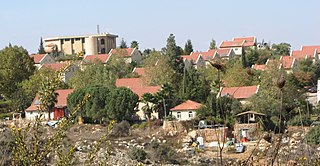
Ofra is an Israeli settlement located in the northern West Bank. Located on the main road between Jerusalem and Nablus, it falls under the jurisdiction of Mateh Binyamin Regional Council. In 2019 it had a population of 3,043.

Amona was an Israeli outpost in the central West Bank. Located on a hill overlooking Ofra within the municipal boundaries of the Mateh Binyamin Regional Council, the village was founded in 1995 on privately owned Palestinian land. As of 2012, its population was around 200. As of October 2013, the outpost lodged 42 families. It was evacuated completely in February 2017 in compliance with a ruling by the Israeli Supreme Court.

Brukhin is an Israeli settlement located in the West Bank's Samarian mountains about thirty km east of Tel Aviv along the Trans-Samaria Highway near the Palestinian town Bruqin and between the Ariel settlement and Rosh HaAyin.
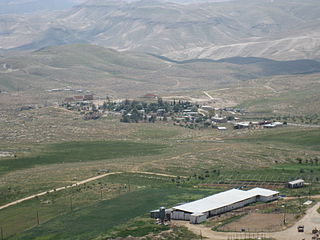
Ma'ale Rehav'am, is an Israeli outpost in the West Bank, located south of Bethlehem and northeast of Hebron in the northeastern Judean Mountains on Road 3698 in the eastern Etzion bloc. Its mother community, the settlement of Nokdim is administrated by the Gush Etzion Regional Council, which lists Ma'ale Rehav'am as a separate "community" on its official website.

Elazar is an Israeli settlement in the Judean Hills region of the West Bank, 18 kilometers south of Jerusalem in the Gush Etzion cluster of settlements. A community settlement, it had a population of 2,459 in 2019. It is administered by the Gush Etzion Regional Council. The international community considers Israeli settlements in the West Bank illegal under international law, although the Israeli government disputes this.

Shvut Rachel is an Israeli settlement and a city in the West Bank, located 45 kilometers (30 mi) north of Jerusalem. Shvut Rachel is located in the Shiloh area in Binyamin. Nearby Israeli settlements include Shilo, Giv'at Har'el, Esh Kodesh, Keeda, and Adei Ad. The village, administrated by the Matte Binyamin Regional Council, has a population of 100 families. The international community considers Israeli settlements in the West Bank illegal under international law, but the Israeli government disputes this. The Sasson Report in 2005 noted that the settlement extends over Palestinian land, part of which is owned by Fawzi Haj Ibrahim Mohammad from Jalud, turned over to the settlement after the Israeli authorities declared it state land.

Avigayil or Abigail is an Israeli outpost in the West Bank. It lies between the settlements of Ma'on and Susya in the Southern Hebron Hills. The outpost is situated east of the Israeli West Bank barrier, 4.7 km kilometers from the Green line on what is officially known as Hilltop 850. Established in October 2001, Avigayil has a population of roughly 50, consisting of 30 families as of 2014, up from 17 registered in 2010, and is within the municipal jurisdiction of the Har Hebron Regional Council.

Migron is an Israeli settlement in the Binyamin Region of the West Bank, located within 2 km of a former outpost by the same name, that was relocated to its present site on 2 September 2012. The outpost was located 14 kilometers north of Jerusalem, it fell under the jurisdiction of the Mateh Binyamin Regional Council. It was the largest outpost of its kind, with a population of 300. The council says it was founded in 1999 and re-founded in 2001, on land registered before 1967 by the villagers of Burqa. The Israeli government contributed NIS 4.3 million from the Construction and Housing Ministry to build Migron. The international community considers Israeli settlements in the West Bank illegal under international law, but the Israeli government disputes this.
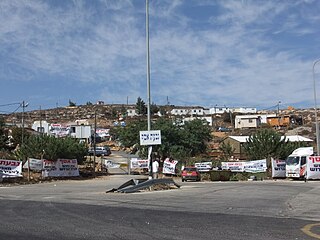
In Israeli law, an outpost is an unauthorized or illegal Israeli settlement within the West Bank, constructed without the required authorization from the Israeli government in contravention of Israeli statutes regulating planning and construction. In Israeli law, outposts are distinguished from settlements authorized by the Israeli government. This distinction between illegal outposts and "legal" settlements is not endorsed by international law, which considers both a violation of the norms, governing belligerent occupations, applicable to the Israeli-occupied West Bank.

Psagot is an Israeli settlement in the West Bank located north of Jerusalem on Tawil hill adjacent to Ramallah, al-Bireh, and Kokhav Ya'akov. Established in 1981, it is organised as a community settlement and falls under the jurisdiction of Binyamin Regional Council, with the council's headquarters located there. In 2019 it had a population of 1,881.

Giv'at Asaf is an Israeli outpost in the West Bank. Located 3.5 kilometres (2.2 mi) from the settlement of Beit El, it falls under the jurisdiction of the Mateh Binyamin Regional Council. It has about 30 structures and is home to some 30 families. It was established in May 2001 after the murder of Asaf Hershkovitz, a resident of Ofra, for whom it was named. The international community, excluding the United States, considers Israeli settlements in the West Bank illegal under international law, but the Israeli government disputes this. According to the 2005 Sasson Report, Giv'at Asaf was built on privately owned Palestinian land, and is therefore also illegal under Israeli law.

Havat Gilad is an Israeli outpost in the Judea and Samaria administrative area of the West Bank, established in 2002 in memory of Gilad Zar, son of Moshe Zar and security coordinator of the Shomron Regional Council, who was shot and killed in 2001.
The international community considers the establishment of Israeli settlements in the Israeli-occupied territories illegal on one of two bases: that they are in violation of Article 49 of the Fourth Geneva Convention, or that they are in breach of international declarations. The United Nations Security Council, the United Nations General Assembly, the International Committee of the Red Cross, the International Court of Justice and the High Contracting Parties to the Convention have all affirmed that the Fourth Geneva Convention applies to Israeli settlements.

This is a timeline of the development of and controversy over Israeli settlements.
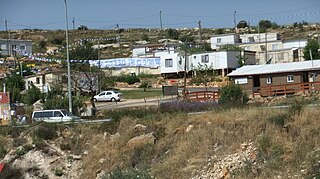
The Levy Report, officially called Report on the Legal Status of Building in Judea and Samaria, is an 89-page report on West Bank settlements published on 9 July 2012, authored by a three-member committee headed by former Israeli Supreme Court justice Edmund Levy. The committee, dubbed the "outpost committee", was appointed by Israel's prime minister Benjamin Netanyahu in late January 2012 to investigate the legal status of unauthorized West Bank Jewish settlements, but also examined whether the Israeli presence in the West Bank is to be considered an occupation or not.
Regavim (רגבים) is a pro-settler Israeli NGO that monitors and pursues legal action in the Israeli court system against any construction lacking Israeli permits undertaken by Palestinians or Bedouins in Israel and in the West Bank. It sees its own mission as one of ensuring "responsible, legal, accountable and environmentally friendly use of Israel's national lands and the return of the rule of law to all areas and aspects of the land and its preservation".
References
- ↑ "Israel 'funded illegal outposts'". 2005-03-09. Retrieved 2020-02-16.
- ↑ "In quotes: Ariel Sharon". BBC News. 2014-01-11. Retrieved 2020-02-16.
- ↑ :: APN :: Shalom Achshav Announcements
- ↑ "Politics: Settlers confirm state complicity in building outposts in Judea and Samaria". Israelinsider . 2005-03-08. Retrieved 2008-06-30.
- ↑ Legal Forum: ´Unauthorized Outposts´ Are Legal Communities - Inside Israel - Israel News - Arutz Sheva
- ↑ "Israel 'funded illegal outposts'". BBC News. March 9, 2005. Retrieved May 23, 2010.
- ↑ Arutz Sheva
- ↑ Peace Now publication: November 2006 report
- ↑ March 2007 report
- ↑ "Peace Now: 32% of land held for settlements is private Palestinian property". Haaretz.com. Retrieved 16 August 2016.